For many women on the road to recovery, music therapy offers a powerful healing outlet that supports emotional growth, self-awareness, and long-term sobriety.
Recovery is not just about quitting substances; it’s about reconnection with yourself, rediscovering your voice, and finding healthy ways to express what words sometimes can’t.
We are committed to a comprehensive method for addressing addiction treatment. A caring approach that supports the mind, body, and spirit, creating balance and promoting overall wellness. That’s where music therapy comes in.
Let’s explore how this creative and science-backed therapy helps women in recovery heal, grow, and thrive.
 What Is Music Therapy
What Is Music Therapy
It is more than just listening to your favorite playlist (though that helps, too). It’s a clinical, evidence-based practice where a certified music therapist uses music to support emotional, cognitive, and physical healing.
In session, women may:
- Write songs to process their feelings
- Play instruments to release stress
- Sing together to build confidence and connection
- Listen to music intentionally to soothe your worries and make you feel relaxed.
You do not have to be a musician or even carry a tune. Music therapy for addiction is about expression, not perfection.
Why It Works for Women in Recovery
Women often enter treatment carrying deep emotional wounds, trauma, anxiety, low self-worth, or struggle with identity. Traditional talk therapy can be beneficial, but some emotions are too overwhelming or too buried to put into words right away.
That’s where music steps in.
Here’s how music therapy empowers women on their recovery journey:
1. It Creates a Safe Space to Feel
Emotions stir by music, we’ve pushed down for years. In a safe, supportive setting, women can begin to process grief, shame, anger, and sadness without judgment. Simply playing or listening to music can help open those emotional doors gently.
2. It Builds Self-Esteem
Writing a song, keeping rhythm on a drum, or even sharing your voice in a group can be empowering. Women who’ve lost confidence in themselves begin to see that they can create, they can express, and they do matter.
3. It Strengthens Connection
Addiction can be isolating. Music therapy encourages group participation, which helps women bond, support each other, and feel less alone. Singing together or collaborating on a creative project builds a sense of sisterhood and belonging.
4. It Supports Emotional Regulation
Early recovery can bring mood swings, anxiety, and cravings. Music therapy teaches coping tools like using certain songs to calm down, shift your mindset, or ground yourself in the moment.
Music Therapy in Action at Serenity Mountain
Music therapy is woven into our holistic addiction treatment for women. Our certified music therapists tailor sessions to meet each woman’s emotional needs, skill level, and comfort zone.
Some activities may include:
- Journaling and lyric writing
- Drumming circle for stress relief
- Guided music listening for relaxation or emotional processing
- Improvisation using simple instruments to explore creativity
- Sharing songs that represent your journey
Every session is designed to be safe, therapeutic, and empowering, and no experience is required.
The Science Behind the Sound
You might wonder, does this work? Yes. Studies show that music therapy in addiction treatment can reduce depression and anxiety, improve emotional regulation, and increase motivation for recovery.
Music activates the brain’s reward system and can help rewire the brain after substance use. It also reduces cortisol (the stress hormone) and supports heart rate regulation, making it a natural calming agent.
When combined with other therapeutic approaches, such as group therapy or trauma-informed counseling, music therapy helps create a more complete healing experience.
A Path Back to Self
One of the most beautiful things about music therapy is how it helps women reconnect with parts of themselves they may have lost to addiction, joy, creativity, courage, and self-expression.
Final Thoughts
Creative outlet can be express through music, it’s a lifeline for many women in recovery. We’re proud to offer this transformative tool as part of our holistic, trauma-informed care.
Whether you’re humming along, writing your truth, or simply listening with an open heart, music can help you heal.
Every woman deserves to find her voice again.
Looking for a women’s recovery program that nurtures the whole you? Contact Serenity Mountain Recovery Center today to learn more about our holistic addiction treatment and how music therapy can support your journey.

